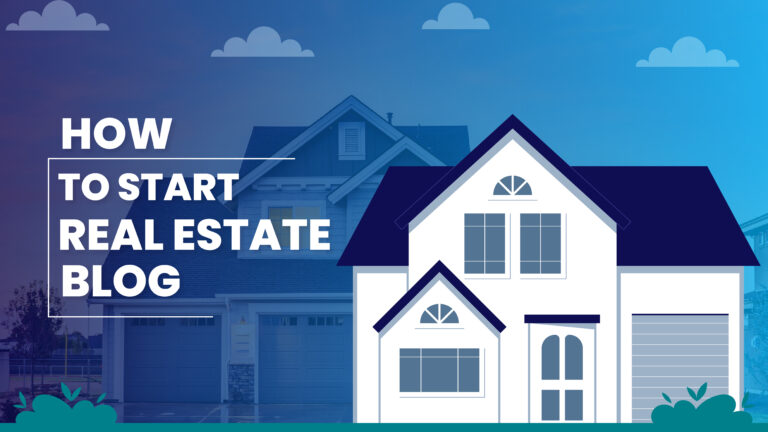In 2026, launching a real estate blog 2026 requires a well-defined strategy, compelling content, and a results-driven marketing plan. In today’s competitive digital landscape, a real estate blog serves as a strategic tool for sharing market insights, engaging potential clients, and establishing industry authority. This comprehensive guide outlines the essential steps to building a successful real estate blog from identifying your niche and crafting high-value content to implementing effective SEO techniques and promoting your brand online.
Starting a real estate blog in 2026 requires thoughtful planning, engaging content, and a clear growth strategy. A well-crafted blog allows real estate professionals to share valuable insights, connect with clients, and establish themselves as trusted voices in the market. It’s not just about writing posts; it’s about creating meaningful content that educates readers, builds relationships, and strengthens your online presence.
What is a Real Estate Blog?
A real estate blog is an online platform where professionals, investors, or enthusiasts share insights, tips, and updates related to the property market. It serves as a valuable resource for buyers, sellers, and real estate agents looking for expert advice on topics such as market trends, investment opportunities, and home-buying tips.
A successful real estate blog focuses on providing informative and engaging content that builds trust and authority. It often includes property insights, local market analysis, and SEO-optimized articles that attract organic traffic. By combining educational content with subtle marketing strategies, real estate blogs help generate leads, enhance brand visibility, and establish industry expertise in an increasingly competitive market.
Why Start a Real Estate Blog in 2026?
In 2026, starting a real estate blog presents immense opportunities as more property searches and transactions move online. The digital landscape continues to evolve, making content marketing and SEO crucial tools for real estate professionals to reach potential clients.
A real estate blog helps in building credibility, showcasing expertise, and attracting qualified leads through valuable, well-optimized content. It also enhances SEO visibility, allowing your website to rank higher on search engines for local and niche property keywords. Moreover, with the rise of virtual property tours and digital storytelling, blogging has become a powerful medium for connecting with audiences, sharing real-life success stories, and staying relevant in the modern property market.
How to Start a Real Estate Blog in 2026
Starting a real estate blog in 2026 is one of the most effective ways to build your brand, share industry expertise, and attract potential clients. With the rise of digital marketing and online property research, blogging allows real estate professionals to establish authority, generate leads, and stay ahead in an evolving market.
Define Your Niche
To start a real estate blog, define your niche. A niche focuses your content and attracts a specific audience. Specializing in residential real estate, commercial properties, real estate investing, or property management helps position you as an expert in that field. Sources like Forbes highlight the importance of niche marketing. Research keywords related to your niche using tools such as Google Keyword Planner or Ahrefs. This data allows you to identify the topics and questions your target audience seeks.
Choose a Blogging Platform
To create your blog, select a blogging platform. WordPress, Wix, and Squarespace are popular choices. WordPress is known for its flexibility and vast array of plugins. Wix offers a user-friendly drag-and-drop interface, while Squarespace provides beautiful templates. According to HubSpot, WordPress powers over 40% of websites globally, making it a leading option. Choose a platform that aligns with your technical expertise and design preferences.
Select a Domain Name
To establish your brand, select a domain name. Your domain name should reflect your blog’s focus and be easy to remember. A concise, relevant domain enhances visibility. Use domain registration services like GoDaddy or Namecheap to secure your domain. Ensure the name is available on social media platforms for consistent branding.
Set Up Hosting
To launch your blog, set up web hosting. Reliable hosting services like Bluehost or SiteGround provide the infrastructure needed for your blog to operate smoothly. Choose a hosting plan that meets your budget and expected traffic. As per HostingAdvice, Bluehost is recommended for beginners due to its affordability and 24/7 support. Proper hosting ensures your blog remains accessible and performs optimally.
Design Your Blog
To create an appealing blog, design your website effectively. Choose a theme that aligns with your brand identity. A professional, clean design enhances user experience. Customize your blog layout to include key elements such as a navigation menu, search bar, and contact information. Integrate social media buttons to promote sharing. According to Smashing Magazine, an aesthetically pleasing design increases user engagement and retention.
Create Quality Content
To attract and retain readers, create high-quality content. Quality content is informative, engaging, and relevant to your audience. Focus on writing blog posts that provide value, such as market trends, buying guides, and neighborhood insights. Sources like Content Marketing Institute emphasize that consistent, valuable content drives traffic and builds trust with your audience. Use visuals like images, infographics, and videos to enhance your posts.
Develop a Content Strategy
To maximize your blog’s effectiveness, develop a content strategy. A well-structured content strategy includes planning topics, setting a posting schedule, and defining your goals. Establishing a content calendar helps maintain consistency. Consider seasonal trends, market changes, and audience interests when planning topics. According to CoSchedule, businesses that plan their content strategy are 395% more likely to succeed.
Optimize for SEO
To increase visibility, optimize your blog for search engines. Search Engine Optimization (SEO) improves your blog’s ranking on search engines like Google. Implement on-page SEO techniques, such as using relevant keywords, optimizing meta descriptions, and structuring headings. Tools like Yoast SEO can assist in optimizing content. According to Moz, effective SEO strategies can lead to increased organic traffic, enhancing your blog’s reach.
Promote Your Blog
To grow your readership, promote your blog effectively. Use social media platforms such as Facebook, Instagram, and LinkedIn to share your content. Engage with your audience by responding to comments and messages. Collaborate with other bloggers or real estate professionals to expand your reach. Email marketing is another effective promotion method. According to HubSpot, email marketing generates $42 for every $1 spent, making it a cost-effective strategy for reaching potential readers.
Monitor Analytics
To assess your blog’s performance, monitor analytics regularly. Tools like Google Analytics provide valuable insights into traffic, user behavior, and content performance. Analyze data to identify popular topics and optimize underperforming content. Regularly reviewing analytics helps adjust your strategy based on real-time data. According to Search Engine Journal, data-driven decisions enhance the effectiveness of marketing efforts.
Engage with Your Audience
To foster community, engage with your audience. Respond to comments on your blog and social media. Encourage readers to share their thoughts and experiences related to real estate. Host Q&A sessions or webinars to address audience questions. Building a loyal community enhances your blog’s credibility. According to Neil Patel, engagement leads to increased trust and long-term relationships with readers.
Monetize Your Blog
To generate income, explore monetization options for your blog. Consider affiliate marketing, sponsored posts, and selling digital products like eBooks or courses. Partner with real estate companies or tools to promote their services. According to Smart Passive Income, affiliate marketing can provide a substantial income stream. Choose monetization methods that align with your audience’s interests to maintain credibility.
Stay Updated with Industry Trends
To maintain relevance, stay updated with industry trends. The real estate market is dynamic, with frequent changes in regulations, technologies, and consumer behavior. Subscribe to real estate newsletters, follow industry leaders on social media, and attend conferences to stay informed. According to Inman News, staying current with industry trends enhances your credibility as a real estate expert.
Conclusion
In 2026, starting a real estate blog offers tremendous potential for growth and credibility in the digital property market. With a clear niche, quality content, and consistent engagement, you can build a platform that attracts readers, nurtures leads, and strengthens your brand authority. By focusing on SEO, tracking performance metrics, and staying aligned with evolving real estate trends, your blog can become a trusted resource and a powerful tool for long-term success.
Frequently Asked Questions (FAQs)
How do I choose a niche for my real estate blog?
Choosing a niche involves researching market demand, identifying your expertise, and focusing on specific topics such as residential, commercial, or investment real estate.
What blogging platform is best for beginners?
WordPress is often recommended for beginners due to its user-friendly interface, extensive customization options, and strong community support.
How can I promote my real estate blog effectively?
Promote your blog through social media, email marketing, collaborations with other bloggers, and engaging with your audience through comments and discussions.
How often should I post on my real estate blog?
Posting frequency depends on your content strategy and audience preferences, but consistency is key. Aim for at least one high-quality post per week.
What are the best monetization strategies for a real estate blog?
Effective monetization strategies include affiliate marketing, sponsored content, selling digital products, and partnering with real estate services or tools.
How can I attract local clients to my real estate blog?
Use local keywords, publish neighborhood guides, and optimize your blog with Google Business Profile for better local visibility.
What type of content works best for real estate blogs?
Focus on market updates, home-buying tips, and local insights. Add visuals like videos and infographics to boost engagement.
How long before a real estate blog gets results?
With consistent content and SEO, most blogs start seeing steady traffic and leads within 3–6 months.


No Comments
you’re really a good webmaster. The web site loading speed is amazing. It seems that you are doing any unique trick. Also, The contents are masterpiece. you’ve done a magnificent job on this topic!
Your comment is awaiting moderation.